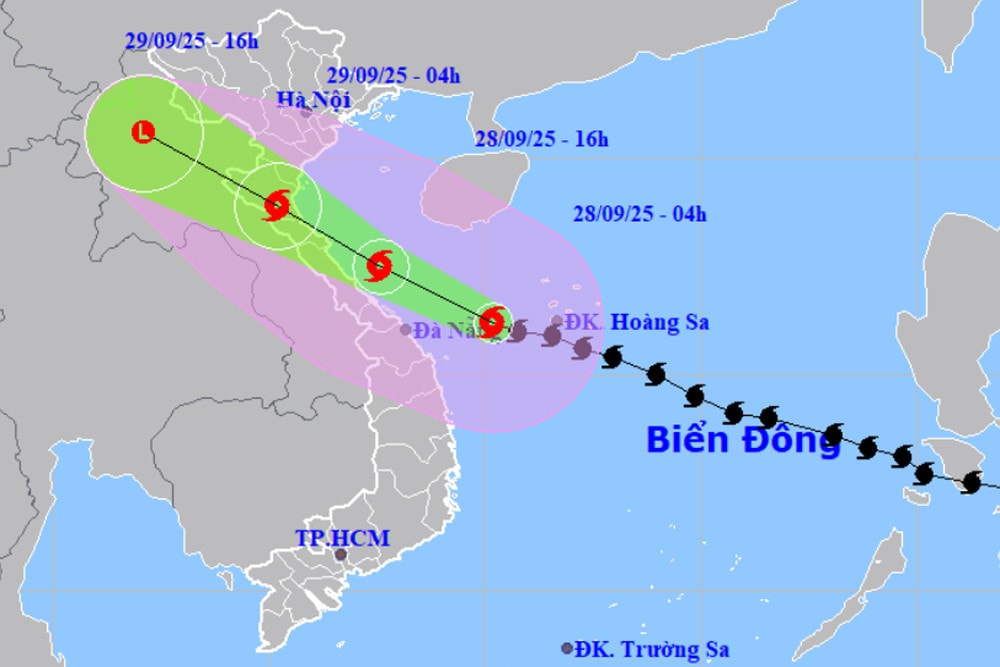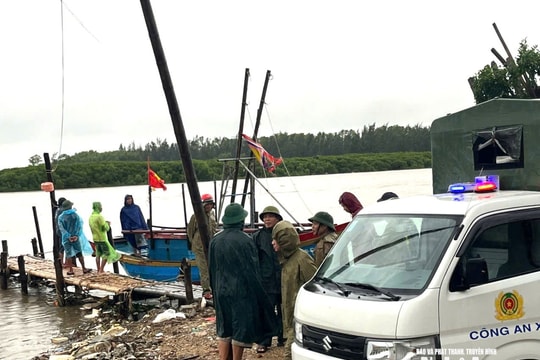Prime Minister: Establishing a forward command committee in the provinces where storm No. 10 passes through
Prime Minister Pham Minh Chinh has just signed and issued Official Dispatch No. 174 requesting ministries, branches and localities to focus on responding to storm No. 10 and floods, landslides, flash floods and landslides.
Telegram sent to secretaries and chairmen of People's Committees of provinces and cities in the Northern and North Central regions (from Da Nang and above); ministers of ministries, ministerial-level agencies, government agencies; Office of the National Civil Defense Steering Committee.
The dispatch stated: According to the forecast of the National Center for Hydro-Meteorological Forecasting, the storm makes landfall at the time of high tide, combined with storm surges and large waves that can cause overflows, breaches, and landslides of sea dykes, flooding low-lying coastal residential areas; the storm can cause heavy rain in the Northern and North Central regions (including Lao territory). Especially in the area from Thanh Hoa to Ha Tinh with total rainfall of about 200-400mm, locally over 600mm, there is a high risk of flash floods, landslides, flooding, and traffic disruption in mountainous and low-lying areas.

The Prime Minister requested ministries, branches and localities to continue to focus on seriously, resolutely and effectively implementing the work of preventing and combating storm No. 10, focusing on a number of specific tasks such as reinforcing and ensuring the safety of dykes, dams and reservoirs; tying down houses; evacuating people in dangerous areas; stockpiling food in areas at risk of isolation...
Accordingly, the secretaries and chairmen of the People's Committees of the provinces and cities in the Northern and North Central regions directed: Continue to review, call on, and guide ships still operating at sea to move out of dangerous areas or to storm shelters to ensure safety; at the same time, deploy solutions to ensure safety for people and ships at anchorages and shelters.
Based on the specific situation in the locality, the secretaries and chairmen of the People's Committees of provinces and cities decide to restrict activities at sea and along the coast, ban the sea, control and restrict traffic, and let students stay home from school to ensure safety during the time affected by storms and heavy rains and floods; immediately deploy protection and reinforcement measures to ensure the safety of dykes and dams, especially sea dykes, river estuaries, and key dams; proactively operate and regulate appropriate reservoirs to be ready to receive floods, ensure the safety of dams and reservoirs, and prevent floods from overlapping floods.
The Prime Minister also requested to immediately deploy the work of tying and reinforcing houses, warehouses, headquarters of agencies, units, educational and medical establishments, production, business and service establishments to reduce damage to production. Especially agricultural production, aquaculture at sea and coastal areas, promptly restore production and business immediately after storms and floods; organize reviews, proactively evacuate and relocate households in dangerous areas to safe places. Pay special attention to places where there have been land subsidence phenomena, places at risk of flash floods, landslides, deep flooding, on boats, rafts, and aquaculture huts; proactively arrange forces to guard and patrol to ensure security and order at evacuation sites, not allowing people to return without ensuring safety.
The Secretary and Chairman of the Provincial and Municipal People's Committees shall proactively direct the arrangement of forces, means, reserves of food, provisions, and necessities in vulnerable areas at risk of being isolated due to landslides and floods to be ready to support the people, not to let people go hungry, thirsty, cold, and to carry out rescue work when bad situations occur...; assign comrades in the standing committee, standing committee, and leaders of departments, branches, and sectors to key areas to directly inspect, urge, and direct the implementation of response work to storms, floods, landslides, flash floods, and landslides.
Arrange forces and means ready to support people in responding to storms and floods
Ministers of ministries, ministerial-level agencies, and government agencies, according to their functions, tasks, and authority, shall proactively direct and urge the implementation of response measures to ensure safety for forces, vehicles, equipment, and facilities under their management, paying special attention to ensuring safety for traffic activities at sea and on rivers, safety of dykes, reservoirs, irrigation dams, hydropower plants, power systems, telecommunications, educational and medical facilities, production, business, and service establishments, etc.
The Ministers of National Defense and Public Security direct military and police forces stationed in the area to review plans, proactively arrange forces and means to be ready to support people in responding to storms, floods, and assist in evacuation and relocation of residents, and rescue when requested.
The Minister of Agriculture and Environment directs and organizes close monitoring, forecasting, and timely informing of storm and flood developments; directs and urges the implementation of storm and flood response work within his authority; advises the Prime Minister and the National Civil Defense Steering Committee on matters beyond his authority.
The Chief of Office of the National Civil Defense Steering Committee closely monitors the situation, coordinates and mobilizes forces and means to support localities in responding to storms and floods according to their authority, paying special attention to areas that have experienced heavy rain, subsidence, and unusual landslides.
| Establishment of forward command committees in provinces where the storm will pass through Deputy Prime Minister Tran Hong Ha was assigned to establish a frontline steering committee in the provinces where the storm passed to focus on handling, preventing, and overcoming the consequences of storms, floods, and landslides; and continue to direct ministries, branches, and localities to promptly deploy response work to storms, floods, subsidence, and landslides. |


.jpeg)

